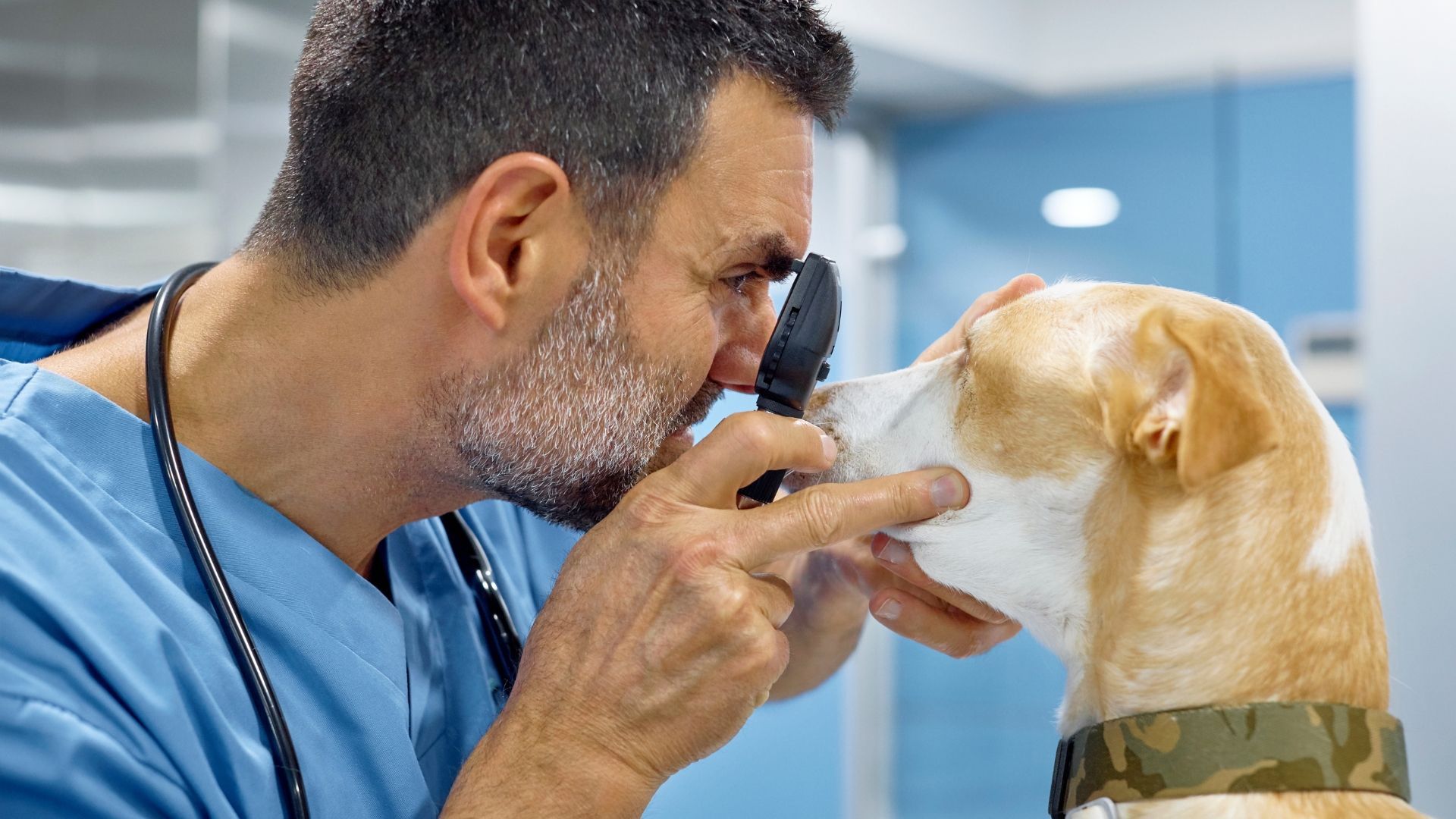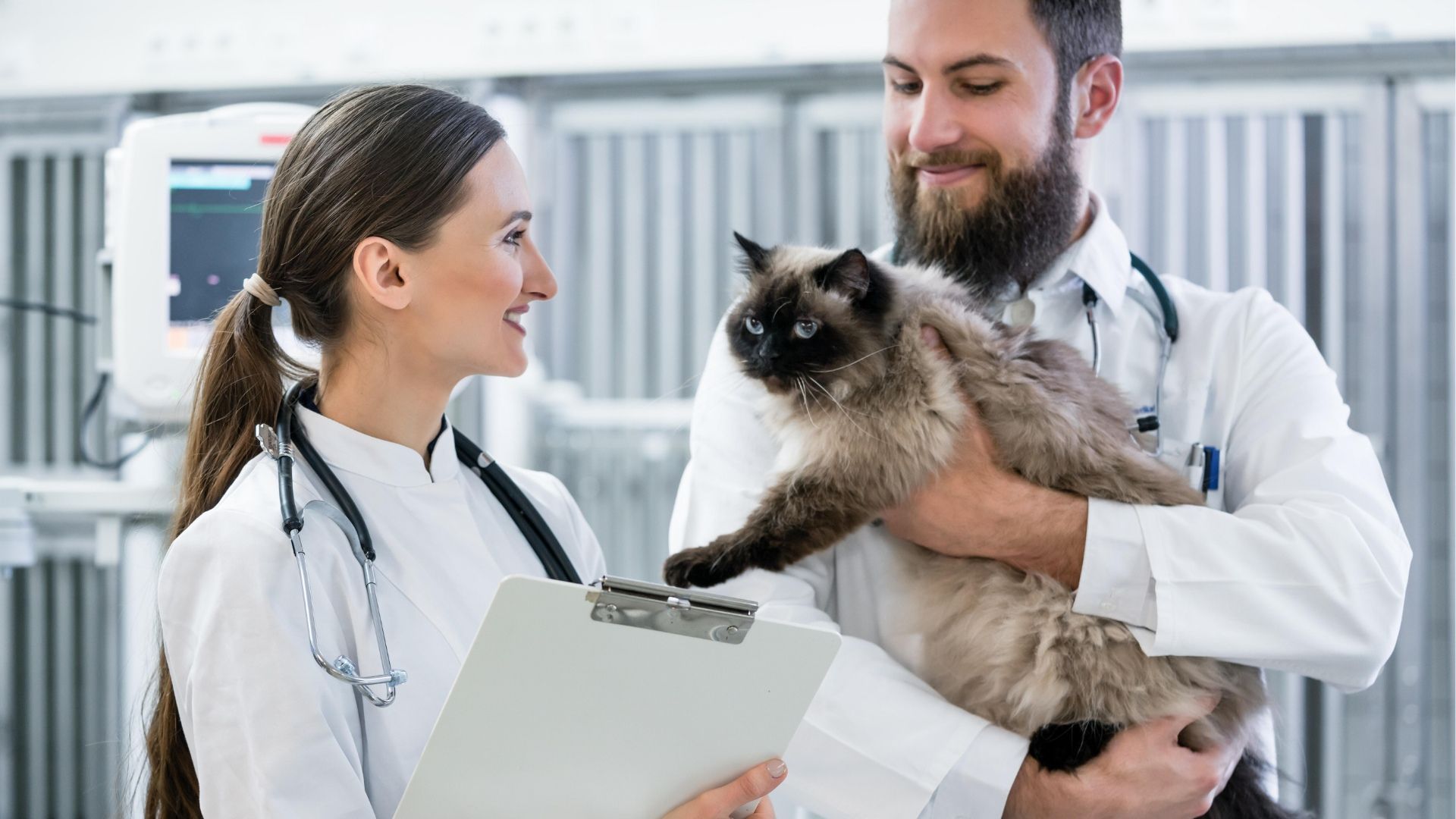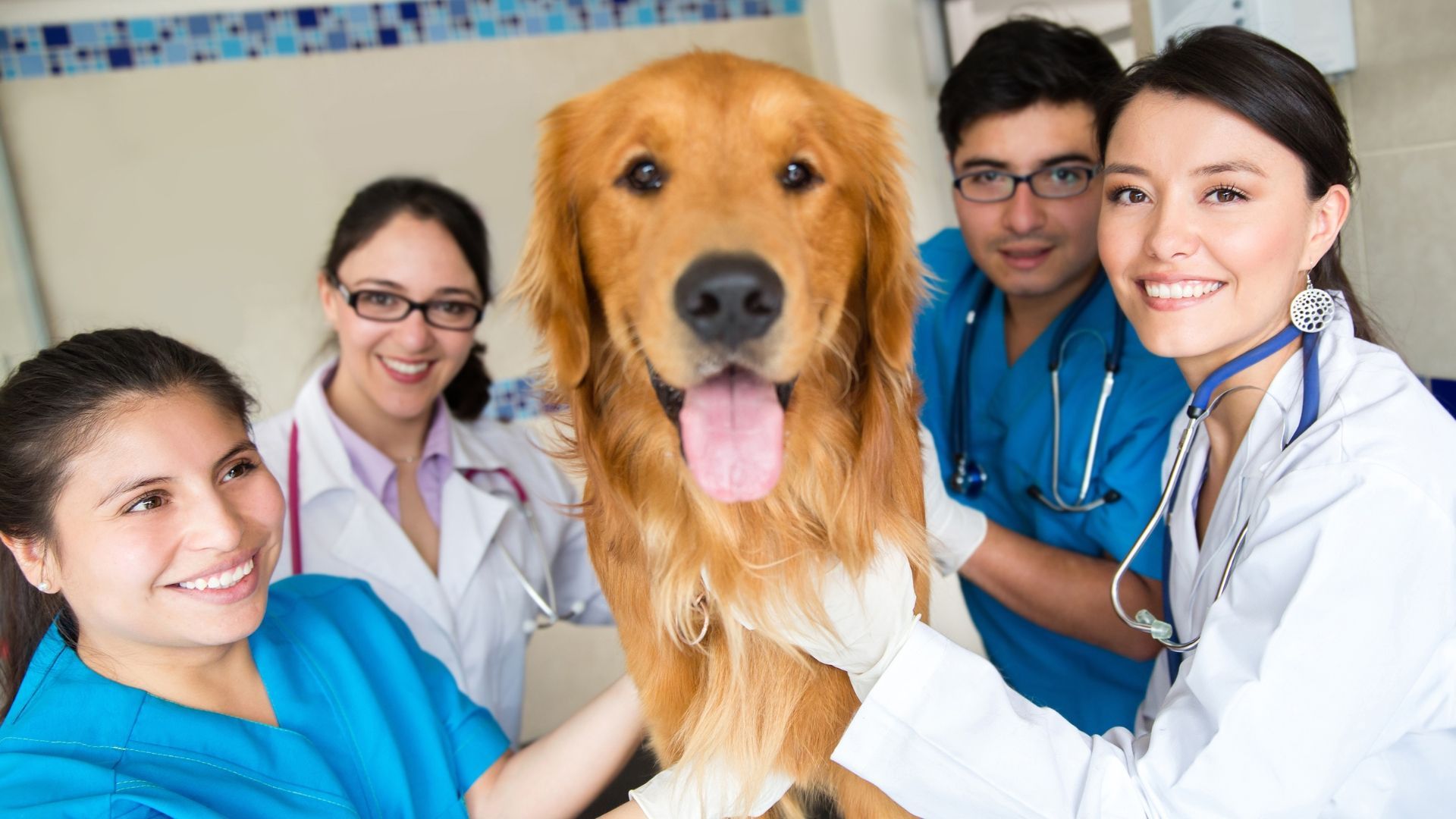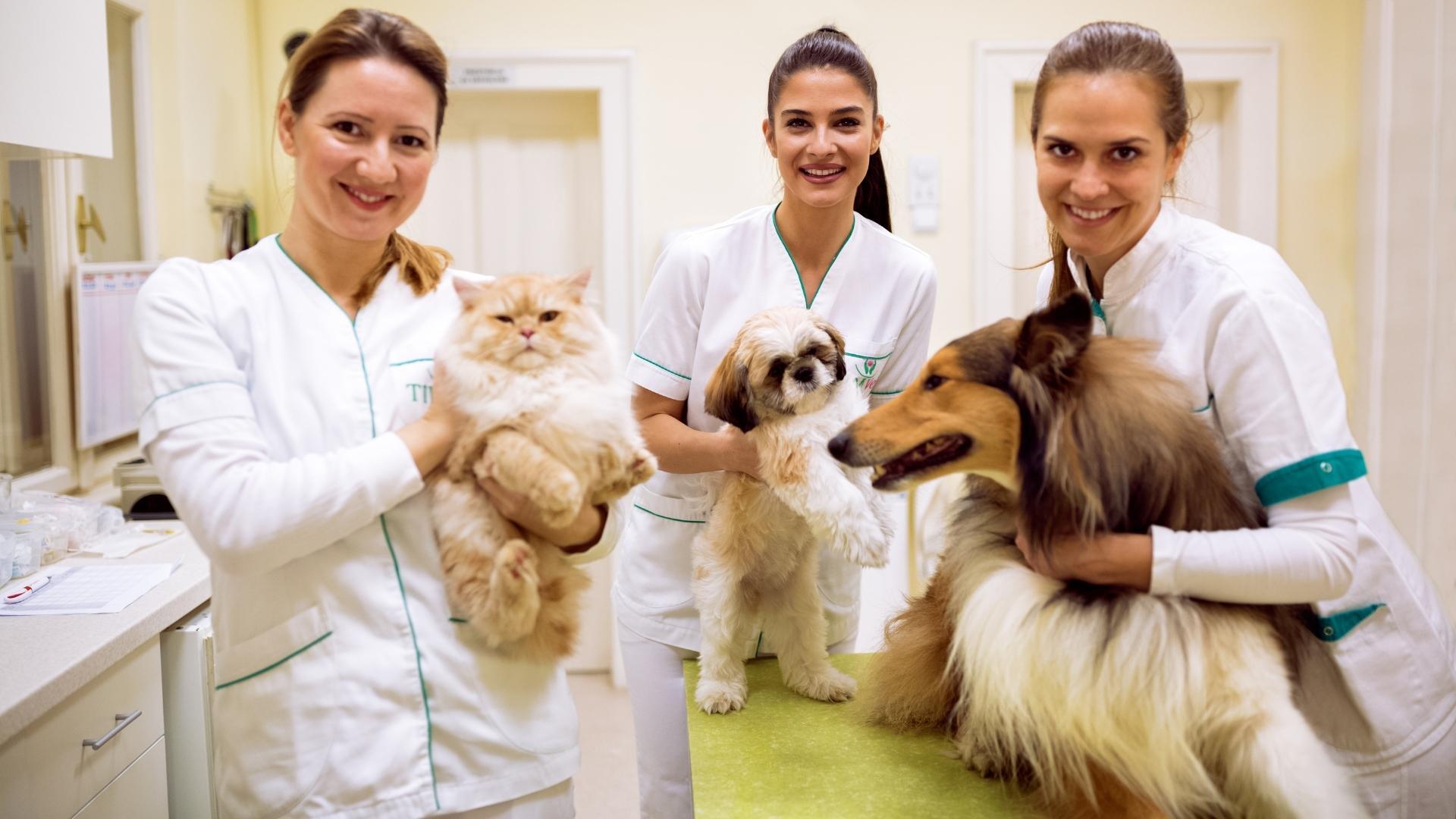BLOG
Want To Learn About Our Veterinary Recruiting And Staffing Solutions?
We'll reach out to share more information about how we can partner with you!
Contact Us
Thank you for contacting us! We will be in touch soon.
Oops, there was an error sending your message.
Please try again later.
Please try again later.

December 19, 2025
Burnout has become one of the most pressing issues in veterinary medicine. Long hours, emotional stress, chronic understaffing, and heavy caseloads create a perfect storm that affects veterinarians, technicians, receptionists, and support staff alike. For employers, addressing burnout isn’t just about supporting staff, but it’s essential for retention, patient care, and the long-term success of the practice. As a trusted vet recruiter, Veterinary Recruiting & Staffing Solutions, we partner with clinics nationwide to help them build strong, sustainable teams. Here’s how clinics can better support staff and reduce burnout within their veterinary workplaces. Why Burnout Is So Common in Veterinary Medicine Burnout in the veterinary field is unique because it blends emotional strain with physical and mental fatigue. Some of the most common contributors include: Emotionally intense cases High caseloads and long hours Administrative overload Financial stress Challenging client interactions These factors add up quickly and if they aren’t addressed, they can lead to compassion fatigue, turnover, and long-term mental health challenges. Employer Strategies to Reduce and Prevent Burnout Supporting veterinary teams requires proactive planning and consistent effort. Below are key strategies that help practices protect employee well-being, maintain high-quality care, and create a healthier workplace culture. 1. Build a Culture of Open Communication Open communication is the foundation of a supportive clinic environment. When staff feel heard and respected, stress is easier to manage and burnout is less likely. Hold regular check-ins or huddles that give employees space to share challenges. Create anonymous feedback options so team members can voice concerns safely. Normalize mental health conversations by discussing stress, compassion fatigue, and workload pressures openly. A supportive environment where staff feel safe speaking up is essential, and something a veterinary recruiter often identifies as a top retention predictor. 2. Support Work–Life Balance Through Smarter Scheduling Scheduling plays a huge role in burnout prevention. Even small improvements can make a major difference. Avoid routinely scheduling excessive overtime or back-to-back long shifts. Offer flexible scheduling options, when possible, such as four-day workweeks, split shifts, or adjusted hours. Encourage staff to use PTO and take breaks, rather than powering through exhaustion. When leaders prioritize balance, employees feel valued both as professionals and as people. 3. Reduce Workload with Better Systems and Delegation Veterinary teams perform a massive amount of labor behind the scenes. Streamlining tasks can significantly reduce stress. Use modern practice management software to simplify records, reminders, and communication. Delegate tasks appropriately, ensuring veterinarians aren’t doing work that technicians or assistants are trained for. Design workflows that reduce unnecessary steps, minimize physical strain, and improve efficiency. Simplifying daily operations helps the whole team breathe easier, and a vet recruiter will often note that this directly improves retention. 4. Prioritize Training, Recognition, and Career Growth Burnout is more likely when staff feel unappreciated or stuck. Employers can help by investing in their team’s long-term success. Provide continuing education support and opportunities for skill development. Recognize hard work with verbal appreciation, incentives, or internal recognition programs. Create mentorship opportunities so new staff feel supported rather than overwhelmed. When staff see a future in your clinic, they’re more likely to stay engaged and committed. 5. Introduce Mental Health and Wellness Resources The emotional demands of veterinary work are unavoidable, but employers can offer tools that help staff manage them. Provide access to counseling or Employee Assistance Programs (EAPs) whenever possible. Offer training in resilience, stress management, and coping skills. Build a psychologically safe culture where mistakes are treated as learning opportunities rather than blame-driven failures. Supporting emotional well-being is essential for keeping teams healthy and stable. Why Addressing Burnout Is Worth the Investment Prioritizing staff well-being benefits clinics in powerful ways: Lower turnover and reduced recruiting costs Higher morale and a more cohesive team Better patient care and client satisfaction More efficient workflows and improved productivity A reputation as a desirable, supportive employer Burnout doesn’t just affect individual staff members; it impacts the entire clinic’s ability to grow and deliver exceptional care. How Veterinary Recruiting & Staffing Solutions Can Help At Veterinary Recruiting & Staffing Solutions, we understand the pressures veterinary professionals face. That’s why we help clinics: Attract and hire skilled, compassionate staff Reduce understaffing, one of the biggest drivers of burnout Improve team structure, scheduling, and workflow Develop long-term retention and employee support strategies Our goal is to help veterinary practices build healthier, more resilient teams so they can provide the best care possible. Final Thoughts Burnout in veterinary medicine is real, but it’s not unavoidable. With the right strategies, employers can create workplaces where veterinary professionals feel supported, valued, and equipped to do the work they love. By prioritizing communication, balance, mental health, and professional growth, clinics can reduce burnout and build strong, sustainable teams. If your clinic needs help strengthening your team or improving retention, partner with a dedicated veterinary recruiter like Veterinary Recruiting & Staffing Solutions to take the next step. Contact us today!

November 12, 2025
Employee retention is one of the biggest challenges veterinary clinics face today. Between long hours, emotional fatigue, limited staffing pools and increasingly competitive compensation demands, keeping talented team members on board requires strategy and commitment. At Veterinary Recruiting & Staffing Solutions , we help veterinary practices not only hire the right people but build a workplace culture and team structure that supports long-term retention. In this blog, we’ll share proven best practices to improve employee retention in veterinary clinics and reduce turnover costs. 1. Hire for long-term fit (not just immediate need) Retention starts with recruitment. When you partner with Veterinary Recruiting & Staffing Solutions, our process includes an in-depth consultation to understand your clinic’s culture, goals and staffing needs. By focusing on candidates whose values align with your clinic’s mission, you set the stage for stronger engagement and loyalty. Use job listings that clearly articulate what your clinic stands for, the daily realities of the role, and the growth opportunities available. 2. Build a positive work environment and support culture Veterinary work can be emotionally and physically demanding. Creating a supportive work environment where team members feel valued, respected, and heard is critical. Some effective strategies: Provide regular check-ins and feedback loops so staff can share concerns, suggestions, or burnout symptoms. Celebrate wins and milestones, e.g., successful procedures, certifications earned, and client testimonials. Ensure adequate staffing levels so employees aren’t continually covering absences, which leads to fatigue and frustration. Foster teamwork and peer support, mentoring junior staff with more experienced colleagues. 3. Offer career development and growth opportunities Retention is strongly influenced by whether staff see a future at the clinic. If experienced veterinary technicians, assistants, or veterinarians feel stagnant, they are more likely to look elsewhere. To combat this: Create clear career pathways (e.g., assistant → senior assistant → lead tech) with defined criteria and milestones. Invest in continuing education, certifications, conferences, or workshops, and share that with your team. Offer mentorship programs that pair less experienced staff with seasoned team members. Promote internally when possible—this signals that long-term commitment pays off. 4. Provide competitive compensation, benefits & recognizable value While culture and growth are important, compensation remains a key factor in retention. Veterinary clinics must be competitive in salaries, benefits and overall rewards: Conduct regular compensation reviews to ensure salaries keep pace with market rates for veterinarians , vet techs and support staff. Consider benefits beyond salary, paid continuing education, certification reimbursement, flexible scheduling, wellness support (because compassion-fatigue is real). Use recognition programs (e.g., employee of the month, milestone anniversaries) to show value beyond pay. Collect feedback to understand what benefits your team values most (e.g., extra paid time off, pet care discounts, shift flexibility) and tailor accordingly. 5. Foster work-life balance and manage workload Overwork is a common contributor to turnover in veterinary settings. To improve retention, you can: Monitor workloads and adjust schedules, so staff aren’t continually on edge. Implement strategies such as rotating weekend or after-hour shifts fairly, ensuring adequate rest between heavy shifts. Provide mental health resources or debriefing sessions because dealing with sick or injured animals is emotionally taxing. Use technology or workflow improvements to reduce administrative burdens so staff can focus more on clinical care and less on paperwork. 6. Listen and act on feedback — create an engaged team Retention is significantly improved when employees feel their voice matters. To build engagement: Conduct quarterly or semi-annual anonymous staff surveys to gather feedback on culture, processes, equipment, and morale. Hold regular team meetings where staff can talk openly about what’s working and what isn’t. Create action plans based on feedback and publicly track progress, so staff see that their input leads to change. Recognize and reward ideas that come from staff, making them an active part of the clinic’s evolution. 7. Monitor retention metrics & proactively address issues Finally, you can’t manage what you don’t measure. Clinics should track key retention metrics such as turnover rate, average tenure of staff, exit-interview feedback, and cost of replacement. With that information, you can identify trends and intervene early. Proactive measures might include exit-interviews that ask: “What could have been done differently?”, “Did you feel valued?”, “Were there resources you needed but didn’t receive?” Retaining Your Veterinary Team = Building a Sustainable Practice In the fast-moving world of veterinary medicine, clinics that invest in thoughtful recruitment, strong culture, staff growth, competitive rewards, work-life balance and engaged feedback loops will stand out, both to prospective candidates and the team you already have. By partnering with Veterinary Recruiting & Staffing Solutions, you’re not only filling positions; you’re building a high performing, committed team that will help carry your clinic forward for years to come. If you’re ready to strengthen your team and improve your employee retention strategy, contact us today. Let us help you build a practice where your staff stay, grow, and contribute to long-term success.

October 23, 2025
Embarking on a veterinarian career is both rewarding and challenging. For aspiring veterinarians, veterinary internships and residency programs provide invaluable hands-on experience, advanced training, and a pathway to specialization. Whether you're a vet student exploring externship opportunities or a recent graduate aiming to deepen your expertise, understanding these programs is crucial. Working with a veterinary recruiter like Veterinary Recruiting & Staffing Solutions can help guide job seekers through these early career steps, connecting them with positions that match their skills and career goals and helping them transition into roles at animal hospitals or specialized veterinary practices. Internships and residencies serve as a bridge between academic training and professional practice. They provide exposure to real-world veterinary medicine, help students develop technical and communication skills, and allow them to explore different specialties. What Are Veterinary Internships? Veterinary internships are structured, post-graduate training programs designed to enhance clinical skills and knowledge. Internships provide: Hands-on Experience: Work under the supervision of experienced veterinarians in various specialties. Exposure to Diverse Cases: Encounter a wide range of medical conditions, surgeries, and treatment protocols. Professional Development: Improve diagnostic, surgical, and client communication skills. These positions allow new graduates to apply their training while continuing to learn in a professional setting. Internships also help candidates determine the areas of veterinary medicine they are most passionate about. Understanding Veterinary Residency Programs Residency programs are advanced training opportunities for veterinarians seeking board certification or specialization in a particular field. Key aspects include: Duration: Typically, 3-4 years depending on the specialty. Structured Training: Combines clinical practice, research, and teaching responsibilities. Board Certification: Successful completion qualifies veterinarians to sit for specialty board exams. Residency programs provide in-depth exposure to specific areas, such as surgery, internal medicine, or emergency care. Graduates are often qualified for higher-level positions in animal hospitals, including Specialist or Administrator roles. These advanced positions allow veterinarians to guide teams, shape clinical practices, and influence animal care standards. Vet Student Opportunities: Externships and Shadowing Even before graduation, vet students can benefit from externships or short-term shadowing experiences. These opportunities allow students to: Observe procedures and daily operations in veterinary clinics. Learn best practices in patient care, client communication, and team collaboration. Build professional networks for future career opportunities. Many students who participate in externships transition into entry-level positions like Receptionist or Kennel Attendant . These roles offer practical experience in a supportive environment, helping students build confidence and skills that will be valuable in advanced veterinary roles. Tips for Maximizing Internship and Residency Experiences To make the most of these programs: Be Proactive: Ask questions, seek feedback, and volunteer for different tasks. Stay Organized: Keep detailed notes on cases, procedures, and treatments observed. Network: Build relationships with veterinarians, technicians, and administrative staff. Reflect: Regularly review what you have learned and identify areas for improvement. Following these tips helps students and new graduates stand out when applying for roles. How Veterinary Recruiting Supports Your Career Whether you’re pursuing a veterinary internship, externship, or residency program, finding the right fit can be overwhelming. A professional veterinary recruiter works as your advocate, connecting you with animal hospitals, specialty practices, or clinics that align with your skills. They can also help you explore related career paths such as veterinary assistant, vet tech, or practice management roles, which are positions that build valuable experience while you prepare for advanced opportunities. Why Choose Veterinary Recruiting & Staffing Solutions? At Veterinary Recruiting & Staffing Solutions, we specialize in connecting veterinary professionals with opportunities that match their experience and career goals. Whether you’re a veterinary student exploring externships or a professional seeking a clinical or leadership role in an animal hospital, our team of veterinary recruiters provides guidance and support every step of the way. Ready to take the next step in your veterinary career? Contact us to get personalized guidance from our expert veterinary recruiters.

September 8, 2025
Finding the perfect associate veterinarian, or a skilled vet tech for your clinic can feel overwhelming. With candidates reviewing multiple veterinary job listings every day, your posting needs to grab attention right away. That’s where Veterinary Recruiting and Staffing Solutions can help. As a dedicated veterinary recruiter, our team understands the veterinary job market and provides the expertise to make your listings stand out and attract the right candidates. 1. Lead with Clarity: Define the Role Generic job ads don’t work anymore. A listing that simply says “associate veterinarian wanted” won’t cut it. Instead, spell out expectations clearly: Include specific duties such as surgical prep, anesthesia monitoring, and client education. For veterinarians , describe caseloads, mentorship opportunities, or areas of specialization. Clarity saves time on both sides and ensures that the candidates applying already have a good sense of the role. 2. Showcase Your Clinic’s Personality Candidates aren’t just looking for a job as a vet, they’re searching for a community and a workplace that reflects their values. Use your listing to highlight: Your clinic’s mission or philosophy. Work–life balance policies. Professional development and continuing education opportunities. This is also where you can build a sense of urgency, define what makes your practice special and why applicants should apply now instead of waiting. 3. Optimize with Keywords Job seekers often search with very specific terms like “jobs at animal clinics” or “veterinary job listings.” Be sure your posting includes relevant keywords such as: Veterinary job listings Jobs at animal clinics Associate veterinarian Hiring veterinarians Attract top veterinary talent Not only will this improve visibility online, but it will also help ensure your listing reaches the right audience. 4. Encourage Candidates to Show Fit Consider including a prompt like “Why do you think we should hire you?” in your application process. It encourages applicants to reflect on their strengths, rather than sending generic resumes, and gives you more insight into how they see themselves fitting in with your clinic. 5. Be Transparent About What You Offer Top candidates want to know what sets your clinic apart. Share details like salary range, benefits, mentorship, relocation support, or flexible scheduling. You might even reference the counteroffer, showing awareness of competitive negotiations tells candidates you value their options and understand the hiring landscape. 6. Highlight Career Growth Opportunities Many veterinary professionals want more than just a job; they want a career path. When writing veterinary job posts, emphasize how your clinic supports long-term growth. For an associate veterinarian, this might mean leadership opportunities, ownership potential, or advanced training. For vet techs , it could be certifications, specialty tracks, or mentorship programs. Highlighting these details in your veterinary job listings helps you attract top veterinary talent who are invested in the future of your clinic, not just filling an immediate need. 7. Follow Smart Veterinary Recruitment Strategies Some tried-and-true strategies to help your veterinary job postings rise above the rest include: Writing veterinary job posts that balance professionalism with warmth. Sharing listings across multiple platforms, including veterinary-specific job boards. Using testimonials from current staff to add credibility. Outlining the next steps in the hiring process so candidates know what to expect. These strategies go a long way in ensuring your clinic attracts veterinary candidates who are both qualified and motivated. Final Thoughts In today’s competitive market, attracting top veterinary talent requires more than just posting an opening, it takes thoughtful strategy, clear communication, and job listings that stand out from the rest. At Veterinary Recruiting and Staffing Solutions, we specialize in helping clinics create effective postings, navigate veterinary job listings, and connect with the right candidates. Whether you’re hiring veterinarians, posting a job for vet techs, or looking for long-term recruitment support, our expertise ensures you’ll attract the best professionals for your team. Ready to hire? Contact Veterinary Recruiting and Staffing Solutions today to partner with a veterinary recruiter who knows how to attract top veterinary talent.
Want To Learn About Our Veterinary Recruiting And Staffing Solutions?
Contact Us
Thank you for subscribing.
Oops, there was an error sending your message.
Please try again later.
Please try again later.

December 19, 2025
Burnout has become one of the most pressing issues in veterinary medicine. Long hours, emotional stress, chronic understaffing, and heavy caseloads create a perfect storm that affects veterinarians, technicians, receptionists, and support staff alike. For employers, addressing burnout isn’t just about supporting staff, but it’s essential for retention, patient care, and the long-term success of the practice. As a trusted vet recruiter, Veterinary Recruiting & Staffing Solutions, we partner with clinics nationwide to help them build strong, sustainable teams. Here’s how clinics can better support staff and reduce burnout within their veterinary workplaces. Why Burnout Is So Common in Veterinary Medicine Burnout in the veterinary field is unique because it blends emotional strain with physical and mental fatigue. Some of the most common contributors include: Emotionally intense cases High caseloads and long hours Administrative overload Financial stress Challenging client interactions These factors add up quickly and if they aren’t addressed, they can lead to compassion fatigue, turnover, and long-term mental health challenges. Employer Strategies to Reduce and Prevent Burnout Supporting veterinary teams requires proactive planning and consistent effort. Below are key strategies that help practices protect employee well-being, maintain high-quality care, and create a healthier workplace culture. 1. Build a Culture of Open Communication Open communication is the foundation of a supportive clinic environment. When staff feel heard and respected, stress is easier to manage and burnout is less likely. Hold regular check-ins or huddles that give employees space to share challenges. Create anonymous feedback options so team members can voice concerns safely. Normalize mental health conversations by discussing stress, compassion fatigue, and workload pressures openly. A supportive environment where staff feel safe speaking up is essential, and something a veterinary recruiter often identifies as a top retention predictor. 2. Support Work–Life Balance Through Smarter Scheduling Scheduling plays a huge role in burnout prevention. Even small improvements can make a major difference. Avoid routinely scheduling excessive overtime or back-to-back long shifts. Offer flexible scheduling options, when possible, such as four-day workweeks, split shifts, or adjusted hours. Encourage staff to use PTO and take breaks, rather than powering through exhaustion. When leaders prioritize balance, employees feel valued both as professionals and as people. 3. Reduce Workload with Better Systems and Delegation Veterinary teams perform a massive amount of labor behind the scenes. Streamlining tasks can significantly reduce stress. Use modern practice management software to simplify records, reminders, and communication. Delegate tasks appropriately, ensuring veterinarians aren’t doing work that technicians or assistants are trained for. Design workflows that reduce unnecessary steps, minimize physical strain, and improve efficiency. Simplifying daily operations helps the whole team breathe easier, and a vet recruiter will often note that this directly improves retention. 4. Prioritize Training, Recognition, and Career Growth Burnout is more likely when staff feel unappreciated or stuck. Employers can help by investing in their team’s long-term success. Provide continuing education support and opportunities for skill development. Recognize hard work with verbal appreciation, incentives, or internal recognition programs. Create mentorship opportunities so new staff feel supported rather than overwhelmed. When staff see a future in your clinic, they’re more likely to stay engaged and committed. 5. Introduce Mental Health and Wellness Resources The emotional demands of veterinary work are unavoidable, but employers can offer tools that help staff manage them. Provide access to counseling or Employee Assistance Programs (EAPs) whenever possible. Offer training in resilience, stress management, and coping skills. Build a psychologically safe culture where mistakes are treated as learning opportunities rather than blame-driven failures. Supporting emotional well-being is essential for keeping teams healthy and stable. Why Addressing Burnout Is Worth the Investment Prioritizing staff well-being benefits clinics in powerful ways: Lower turnover and reduced recruiting costs Higher morale and a more cohesive team Better patient care and client satisfaction More efficient workflows and improved productivity A reputation as a desirable, supportive employer Burnout doesn’t just affect individual staff members; it impacts the entire clinic’s ability to grow and deliver exceptional care. How Veterinary Recruiting & Staffing Solutions Can Help At Veterinary Recruiting & Staffing Solutions, we understand the pressures veterinary professionals face. That’s why we help clinics: Attract and hire skilled, compassionate staff Reduce understaffing, one of the biggest drivers of burnout Improve team structure, scheduling, and workflow Develop long-term retention and employee support strategies Our goal is to help veterinary practices build healthier, more resilient teams so they can provide the best care possible. Final Thoughts Burnout in veterinary medicine is real, but it’s not unavoidable. With the right strategies, employers can create workplaces where veterinary professionals feel supported, valued, and equipped to do the work they love. By prioritizing communication, balance, mental health, and professional growth, clinics can reduce burnout and build strong, sustainable teams. If your clinic needs help strengthening your team or improving retention, partner with a dedicated veterinary recruiter like Veterinary Recruiting & Staffing Solutions to take the next step. Contact us today!

November 12, 2025
Employee retention is one of the biggest challenges veterinary clinics face today. Between long hours, emotional fatigue, limited staffing pools and increasingly competitive compensation demands, keeping talented team members on board requires strategy and commitment. At Veterinary Recruiting & Staffing Solutions , we help veterinary practices not only hire the right people but build a workplace culture and team structure that supports long-term retention. In this blog, we’ll share proven best practices to improve employee retention in veterinary clinics and reduce turnover costs. 1. Hire for long-term fit (not just immediate need) Retention starts with recruitment. When you partner with Veterinary Recruiting & Staffing Solutions, our process includes an in-depth consultation to understand your clinic’s culture, goals and staffing needs. By focusing on candidates whose values align with your clinic’s mission, you set the stage for stronger engagement and loyalty. Use job listings that clearly articulate what your clinic stands for, the daily realities of the role, and the growth opportunities available. 2. Build a positive work environment and support culture Veterinary work can be emotionally and physically demanding. Creating a supportive work environment where team members feel valued, respected, and heard is critical. Some effective strategies: Provide regular check-ins and feedback loops so staff can share concerns, suggestions, or burnout symptoms. Celebrate wins and milestones, e.g., successful procedures, certifications earned, and client testimonials. Ensure adequate staffing levels so employees aren’t continually covering absences, which leads to fatigue and frustration. Foster teamwork and peer support, mentoring junior staff with more experienced colleagues. 3. Offer career development and growth opportunities Retention is strongly influenced by whether staff see a future at the clinic. If experienced veterinary technicians, assistants, or veterinarians feel stagnant, they are more likely to look elsewhere. To combat this: Create clear career pathways (e.g., assistant → senior assistant → lead tech) with defined criteria and milestones. Invest in continuing education, certifications, conferences, or workshops, and share that with your team. Offer mentorship programs that pair less experienced staff with seasoned team members. Promote internally when possible—this signals that long-term commitment pays off. 4. Provide competitive compensation, benefits & recognizable value While culture and growth are important, compensation remains a key factor in retention. Veterinary clinics must be competitive in salaries, benefits and overall rewards: Conduct regular compensation reviews to ensure salaries keep pace with market rates for veterinarians , vet techs and support staff. Consider benefits beyond salary, paid continuing education, certification reimbursement, flexible scheduling, wellness support (because compassion-fatigue is real). Use recognition programs (e.g., employee of the month, milestone anniversaries) to show value beyond pay. Collect feedback to understand what benefits your team values most (e.g., extra paid time off, pet care discounts, shift flexibility) and tailor accordingly. 5. Foster work-life balance and manage workload Overwork is a common contributor to turnover in veterinary settings. To improve retention, you can: Monitor workloads and adjust schedules, so staff aren’t continually on edge. Implement strategies such as rotating weekend or after-hour shifts fairly, ensuring adequate rest between heavy shifts. Provide mental health resources or debriefing sessions because dealing with sick or injured animals is emotionally taxing. Use technology or workflow improvements to reduce administrative burdens so staff can focus more on clinical care and less on paperwork. 6. Listen and act on feedback — create an engaged team Retention is significantly improved when employees feel their voice matters. To build engagement: Conduct quarterly or semi-annual anonymous staff surveys to gather feedback on culture, processes, equipment, and morale. Hold regular team meetings where staff can talk openly about what’s working and what isn’t. Create action plans based on feedback and publicly track progress, so staff see that their input leads to change. Recognize and reward ideas that come from staff, making them an active part of the clinic’s evolution. 7. Monitor retention metrics & proactively address issues Finally, you can’t manage what you don’t measure. Clinics should track key retention metrics such as turnover rate, average tenure of staff, exit-interview feedback, and cost of replacement. With that information, you can identify trends and intervene early. Proactive measures might include exit-interviews that ask: “What could have been done differently?”, “Did you feel valued?”, “Were there resources you needed but didn’t receive?” Retaining Your Veterinary Team = Building a Sustainable Practice In the fast-moving world of veterinary medicine, clinics that invest in thoughtful recruitment, strong culture, staff growth, competitive rewards, work-life balance and engaged feedback loops will stand out, both to prospective candidates and the team you already have. By partnering with Veterinary Recruiting & Staffing Solutions, you’re not only filling positions; you’re building a high performing, committed team that will help carry your clinic forward for years to come. If you’re ready to strengthen your team and improve your employee retention strategy, contact us today. Let us help you build a practice where your staff stay, grow, and contribute to long-term success.

October 23, 2025
Embarking on a veterinarian career is both rewarding and challenging. For aspiring veterinarians, veterinary internships and residency programs provide invaluable hands-on experience, advanced training, and a pathway to specialization. Whether you're a vet student exploring externship opportunities or a recent graduate aiming to deepen your expertise, understanding these programs is crucial. Working with a veterinary recruiter like Veterinary Recruiting & Staffing Solutions can help guide job seekers through these early career steps, connecting them with positions that match their skills and career goals and helping them transition into roles at animal hospitals or specialized veterinary practices. Internships and residencies serve as a bridge between academic training and professional practice. They provide exposure to real-world veterinary medicine, help students develop technical and communication skills, and allow them to explore different specialties. What Are Veterinary Internships? Veterinary internships are structured, post-graduate training programs designed to enhance clinical skills and knowledge. Internships provide: Hands-on Experience: Work under the supervision of experienced veterinarians in various specialties. Exposure to Diverse Cases: Encounter a wide range of medical conditions, surgeries, and treatment protocols. Professional Development: Improve diagnostic, surgical, and client communication skills. These positions allow new graduates to apply their training while continuing to learn in a professional setting. Internships also help candidates determine the areas of veterinary medicine they are most passionate about. Understanding Veterinary Residency Programs Residency programs are advanced training opportunities for veterinarians seeking board certification or specialization in a particular field. Key aspects include: Duration: Typically, 3-4 years depending on the specialty. Structured Training: Combines clinical practice, research, and teaching responsibilities. Board Certification: Successful completion qualifies veterinarians to sit for specialty board exams. Residency programs provide in-depth exposure to specific areas, such as surgery, internal medicine, or emergency care. Graduates are often qualified for higher-level positions in animal hospitals, including Specialist or Administrator roles. These advanced positions allow veterinarians to guide teams, shape clinical practices, and influence animal care standards. Vet Student Opportunities: Externships and Shadowing Even before graduation, vet students can benefit from externships or short-term shadowing experiences. These opportunities allow students to: Observe procedures and daily operations in veterinary clinics. Learn best practices in patient care, client communication, and team collaboration. Build professional networks for future career opportunities. Many students who participate in externships transition into entry-level positions like Receptionist or Kennel Attendant . These roles offer practical experience in a supportive environment, helping students build confidence and skills that will be valuable in advanced veterinary roles. Tips for Maximizing Internship and Residency Experiences To make the most of these programs: Be Proactive: Ask questions, seek feedback, and volunteer for different tasks. Stay Organized: Keep detailed notes on cases, procedures, and treatments observed. Network: Build relationships with veterinarians, technicians, and administrative staff. Reflect: Regularly review what you have learned and identify areas for improvement. Following these tips helps students and new graduates stand out when applying for roles. How Veterinary Recruiting Supports Your Career Whether you’re pursuing a veterinary internship, externship, or residency program, finding the right fit can be overwhelming. A professional veterinary recruiter works as your advocate, connecting you with animal hospitals, specialty practices, or clinics that align with your skills. They can also help you explore related career paths such as veterinary assistant, vet tech, or practice management roles, which are positions that build valuable experience while you prepare for advanced opportunities. Why Choose Veterinary Recruiting & Staffing Solutions? At Veterinary Recruiting & Staffing Solutions, we specialize in connecting veterinary professionals with opportunities that match their experience and career goals. Whether you’re a veterinary student exploring externships or a professional seeking a clinical or leadership role in an animal hospital, our team of veterinary recruiters provides guidance and support every step of the way. Ready to take the next step in your veterinary career? Contact us to get personalized guidance from our expert veterinary recruiters.

September 8, 2025
Finding the perfect associate veterinarian, or a skilled vet tech for your clinic can feel overwhelming. With candidates reviewing multiple veterinary job listings every day, your posting needs to grab attention right away. That’s where Veterinary Recruiting and Staffing Solutions can help. As a dedicated veterinary recruiter, our team understands the veterinary job market and provides the expertise to make your listings stand out and attract the right candidates. 1. Lead with Clarity: Define the Role Generic job ads don’t work anymore. A listing that simply says “associate veterinarian wanted” won’t cut it. Instead, spell out expectations clearly: Include specific duties such as surgical prep, anesthesia monitoring, and client education. For veterinarians , describe caseloads, mentorship opportunities, or areas of specialization. Clarity saves time on both sides and ensures that the candidates applying already have a good sense of the role. 2. Showcase Your Clinic’s Personality Candidates aren’t just looking for a job as a vet, they’re searching for a community and a workplace that reflects their values. Use your listing to highlight: Your clinic’s mission or philosophy. Work–life balance policies. Professional development and continuing education opportunities. This is also where you can build a sense of urgency, define what makes your practice special and why applicants should apply now instead of waiting. 3. Optimize with Keywords Job seekers often search with very specific terms like “jobs at animal clinics” or “veterinary job listings.” Be sure your posting includes relevant keywords such as: Veterinary job listings Jobs at animal clinics Associate veterinarian Hiring veterinarians Attract top veterinary talent Not only will this improve visibility online, but it will also help ensure your listing reaches the right audience. 4. Encourage Candidates to Show Fit Consider including a prompt like “Why do you think we should hire you?” in your application process. It encourages applicants to reflect on their strengths, rather than sending generic resumes, and gives you more insight into how they see themselves fitting in with your clinic. 5. Be Transparent About What You Offer Top candidates want to know what sets your clinic apart. Share details like salary range, benefits, mentorship, relocation support, or flexible scheduling. You might even reference the counteroffer, showing awareness of competitive negotiations tells candidates you value their options and understand the hiring landscape. 6. Highlight Career Growth Opportunities Many veterinary professionals want more than just a job; they want a career path. When writing veterinary job posts, emphasize how your clinic supports long-term growth. For an associate veterinarian, this might mean leadership opportunities, ownership potential, or advanced training. For vet techs , it could be certifications, specialty tracks, or mentorship programs. Highlighting these details in your veterinary job listings helps you attract top veterinary talent who are invested in the future of your clinic, not just filling an immediate need. 7. Follow Smart Veterinary Recruitment Strategies Some tried-and-true strategies to help your veterinary job postings rise above the rest include: Writing veterinary job posts that balance professionalism with warmth. Sharing listings across multiple platforms, including veterinary-specific job boards. Using testimonials from current staff to add credibility. Outlining the next steps in the hiring process so candidates know what to expect. These strategies go a long way in ensuring your clinic attracts veterinary candidates who are both qualified and motivated. Final Thoughts In today’s competitive market, attracting top veterinary talent requires more than just posting an opening, it takes thoughtful strategy, clear communication, and job listings that stand out from the rest. At Veterinary Recruiting and Staffing Solutions, we specialize in helping clinics create effective postings, navigate veterinary job listings, and connect with the right candidates. Whether you’re hiring veterinarians, posting a job for vet techs, or looking for long-term recruitment support, our expertise ensures you’ll attract the best professionals for your team. Ready to hire? Contact Veterinary Recruiting and Staffing Solutions today to partner with a veterinary recruiter who knows how to attract top veterinary talent.
Want To Learn About Our Veterinary Recruiting And Staffing Solutions?
We'll reach out to share more information about how we can partner with you!
Contact Us
Thank you for reaching out. We will contact you soon!
Oops, there was an error sending your message.
Please try again later.
Please try again later.

December 19, 2025
Burnout has become one of the most pressing issues in veterinary medicine. Long hours, emotional stress, chronic understaffing, and heavy caseloads create a perfect storm that affects veterinarians, technicians, receptionists, and support staff alike. For employers, addressing burnout isn’t just about supporting staff, but it’s essential for retention, patient care, and the long-term success of the practice. As a trusted vet recruiter, Veterinary Recruiting & Staffing Solutions, we partner with clinics nationwide to help them build strong, sustainable teams. Here’s how clinics can better support staff and reduce burnout within their veterinary workplaces. Why Burnout Is So Common in Veterinary Medicine Burnout in the veterinary field is unique because it blends emotional strain with physical and mental fatigue. Some of the most common contributors include: Emotionally intense cases High caseloads and long hours Administrative overload Financial stress Challenging client interactions These factors add up quickly and if they aren’t addressed, they can lead to compassion fatigue, turnover, and long-term mental health challenges. Employer Strategies to Reduce and Prevent Burnout Supporting veterinary teams requires proactive planning and consistent effort. Below are key strategies that help practices protect employee well-being, maintain high-quality care, and create a healthier workplace culture. 1. Build a Culture of Open Communication Open communication is the foundation of a supportive clinic environment. When staff feel heard and respected, stress is easier to manage and burnout is less likely. Hold regular check-ins or huddles that give employees space to share challenges. Create anonymous feedback options so team members can voice concerns safely. Normalize mental health conversations by discussing stress, compassion fatigue, and workload pressures openly. A supportive environment where staff feel safe speaking up is essential, and something a veterinary recruiter often identifies as a top retention predictor. 2. Support Work–Life Balance Through Smarter Scheduling Scheduling plays a huge role in burnout prevention. Even small improvements can make a major difference. Avoid routinely scheduling excessive overtime or back-to-back long shifts. Offer flexible scheduling options, when possible, such as four-day workweeks, split shifts, or adjusted hours. Encourage staff to use PTO and take breaks, rather than powering through exhaustion. When leaders prioritize balance, employees feel valued both as professionals and as people. 3. Reduce Workload with Better Systems and Delegation Veterinary teams perform a massive amount of labor behind the scenes. Streamlining tasks can significantly reduce stress. Use modern practice management software to simplify records, reminders, and communication. Delegate tasks appropriately, ensuring veterinarians aren’t doing work that technicians or assistants are trained for. Design workflows that reduce unnecessary steps, minimize physical strain, and improve efficiency. Simplifying daily operations helps the whole team breathe easier, and a vet recruiter will often note that this directly improves retention. 4. Prioritize Training, Recognition, and Career Growth Burnout is more likely when staff feel unappreciated or stuck. Employers can help by investing in their team’s long-term success. Provide continuing education support and opportunities for skill development. Recognize hard work with verbal appreciation, incentives, or internal recognition programs. Create mentorship opportunities so new staff feel supported rather than overwhelmed. When staff see a future in your clinic, they’re more likely to stay engaged and committed. 5. Introduce Mental Health and Wellness Resources The emotional demands of veterinary work are unavoidable, but employers can offer tools that help staff manage them. Provide access to counseling or Employee Assistance Programs (EAPs) whenever possible. Offer training in resilience, stress management, and coping skills. Build a psychologically safe culture where mistakes are treated as learning opportunities rather than blame-driven failures. Supporting emotional well-being is essential for keeping teams healthy and stable. Why Addressing Burnout Is Worth the Investment Prioritizing staff well-being benefits clinics in powerful ways: Lower turnover and reduced recruiting costs Higher morale and a more cohesive team Better patient care and client satisfaction More efficient workflows and improved productivity A reputation as a desirable, supportive employer Burnout doesn’t just affect individual staff members; it impacts the entire clinic’s ability to grow and deliver exceptional care. How Veterinary Recruiting & Staffing Solutions Can Help At Veterinary Recruiting & Staffing Solutions, we understand the pressures veterinary professionals face. That’s why we help clinics: Attract and hire skilled, compassionate staff Reduce understaffing, one of the biggest drivers of burnout Improve team structure, scheduling, and workflow Develop long-term retention and employee support strategies Our goal is to help veterinary practices build healthier, more resilient teams so they can provide the best care possible. Final Thoughts Burnout in veterinary medicine is real, but it’s not unavoidable. With the right strategies, employers can create workplaces where veterinary professionals feel supported, valued, and equipped to do the work they love. By prioritizing communication, balance, mental health, and professional growth, clinics can reduce burnout and build strong, sustainable teams. If your clinic needs help strengthening your team or improving retention, partner with a dedicated veterinary recruiter like Veterinary Recruiting & Staffing Solutions to take the next step. Contact us today!

November 12, 2025
Employee retention is one of the biggest challenges veterinary clinics face today. Between long hours, emotional fatigue, limited staffing pools and increasingly competitive compensation demands, keeping talented team members on board requires strategy and commitment. At Veterinary Recruiting & Staffing Solutions , we help veterinary practices not only hire the right people but build a workplace culture and team structure that supports long-term retention. In this blog, we’ll share proven best practices to improve employee retention in veterinary clinics and reduce turnover costs. 1. Hire for long-term fit (not just immediate need) Retention starts with recruitment. When you partner with Veterinary Recruiting & Staffing Solutions, our process includes an in-depth consultation to understand your clinic’s culture, goals and staffing needs. By focusing on candidates whose values align with your clinic’s mission, you set the stage for stronger engagement and loyalty. Use job listings that clearly articulate what your clinic stands for, the daily realities of the role, and the growth opportunities available. 2. Build a positive work environment and support culture Veterinary work can be emotionally and physically demanding. Creating a supportive work environment where team members feel valued, respected, and heard is critical. Some effective strategies: Provide regular check-ins and feedback loops so staff can share concerns, suggestions, or burnout symptoms. Celebrate wins and milestones, e.g., successful procedures, certifications earned, and client testimonials. Ensure adequate staffing levels so employees aren’t continually covering absences, which leads to fatigue and frustration. Foster teamwork and peer support, mentoring junior staff with more experienced colleagues. 3. Offer career development and growth opportunities Retention is strongly influenced by whether staff see a future at the clinic. If experienced veterinary technicians, assistants, or veterinarians feel stagnant, they are more likely to look elsewhere. To combat this: Create clear career pathways (e.g., assistant → senior assistant → lead tech) with defined criteria and milestones. Invest in continuing education, certifications, conferences, or workshops, and share that with your team. Offer mentorship programs that pair less experienced staff with seasoned team members. Promote internally when possible—this signals that long-term commitment pays off. 4. Provide competitive compensation, benefits & recognizable value While culture and growth are important, compensation remains a key factor in retention. Veterinary clinics must be competitive in salaries, benefits and overall rewards: Conduct regular compensation reviews to ensure salaries keep pace with market rates for veterinarians , vet techs and support staff. Consider benefits beyond salary, paid continuing education, certification reimbursement, flexible scheduling, wellness support (because compassion-fatigue is real). Use recognition programs (e.g., employee of the month, milestone anniversaries) to show value beyond pay. Collect feedback to understand what benefits your team values most (e.g., extra paid time off, pet care discounts, shift flexibility) and tailor accordingly. 5. Foster work-life balance and manage workload Overwork is a common contributor to turnover in veterinary settings. To improve retention, you can: Monitor workloads and adjust schedules, so staff aren’t continually on edge. Implement strategies such as rotating weekend or after-hour shifts fairly, ensuring adequate rest between heavy shifts. Provide mental health resources or debriefing sessions because dealing with sick or injured animals is emotionally taxing. Use technology or workflow improvements to reduce administrative burdens so staff can focus more on clinical care and less on paperwork. 6. Listen and act on feedback — create an engaged team Retention is significantly improved when employees feel their voice matters. To build engagement: Conduct quarterly or semi-annual anonymous staff surveys to gather feedback on culture, processes, equipment, and morale. Hold regular team meetings where staff can talk openly about what’s working and what isn’t. Create action plans based on feedback and publicly track progress, so staff see that their input leads to change. Recognize and reward ideas that come from staff, making them an active part of the clinic’s evolution. 7. Monitor retention metrics & proactively address issues Finally, you can’t manage what you don’t measure. Clinics should track key retention metrics such as turnover rate, average tenure of staff, exit-interview feedback, and cost of replacement. With that information, you can identify trends and intervene early. Proactive measures might include exit-interviews that ask: “What could have been done differently?”, “Did you feel valued?”, “Were there resources you needed but didn’t receive?” Retaining Your Veterinary Team = Building a Sustainable Practice In the fast-moving world of veterinary medicine, clinics that invest in thoughtful recruitment, strong culture, staff growth, competitive rewards, work-life balance and engaged feedback loops will stand out, both to prospective candidates and the team you already have. By partnering with Veterinary Recruiting & Staffing Solutions, you’re not only filling positions; you’re building a high performing, committed team that will help carry your clinic forward for years to come. If you’re ready to strengthen your team and improve your employee retention strategy, contact us today. Let us help you build a practice where your staff stay, grow, and contribute to long-term success.

October 23, 2025
Embarking on a veterinarian career is both rewarding and challenging. For aspiring veterinarians, veterinary internships and residency programs provide invaluable hands-on experience, advanced training, and a pathway to specialization. Whether you're a vet student exploring externship opportunities or a recent graduate aiming to deepen your expertise, understanding these programs is crucial. Working with a veterinary recruiter like Veterinary Recruiting & Staffing Solutions can help guide job seekers through these early career steps, connecting them with positions that match their skills and career goals and helping them transition into roles at animal hospitals or specialized veterinary practices. Internships and residencies serve as a bridge between academic training and professional practice. They provide exposure to real-world veterinary medicine, help students develop technical and communication skills, and allow them to explore different specialties. What Are Veterinary Internships? Veterinary internships are structured, post-graduate training programs designed to enhance clinical skills and knowledge. Internships provide: Hands-on Experience: Work under the supervision of experienced veterinarians in various specialties. Exposure to Diverse Cases: Encounter a wide range of medical conditions, surgeries, and treatment protocols. Professional Development: Improve diagnostic, surgical, and client communication skills. These positions allow new graduates to apply their training while continuing to learn in a professional setting. Internships also help candidates determine the areas of veterinary medicine they are most passionate about. Understanding Veterinary Residency Programs Residency programs are advanced training opportunities for veterinarians seeking board certification or specialization in a particular field. Key aspects include: Duration: Typically, 3-4 years depending on the specialty. Structured Training: Combines clinical practice, research, and teaching responsibilities. Board Certification: Successful completion qualifies veterinarians to sit for specialty board exams. Residency programs provide in-depth exposure to specific areas, such as surgery, internal medicine, or emergency care. Graduates are often qualified for higher-level positions in animal hospitals, including Specialist or Administrator roles. These advanced positions allow veterinarians to guide teams, shape clinical practices, and influence animal care standards. Vet Student Opportunities: Externships and Shadowing Even before graduation, vet students can benefit from externships or short-term shadowing experiences. These opportunities allow students to: Observe procedures and daily operations in veterinary clinics. Learn best practices in patient care, client communication, and team collaboration. Build professional networks for future career opportunities. Many students who participate in externships transition into entry-level positions like Receptionist or Kennel Attendant . These roles offer practical experience in a supportive environment, helping students build confidence and skills that will be valuable in advanced veterinary roles. Tips for Maximizing Internship and Residency Experiences To make the most of these programs: Be Proactive: Ask questions, seek feedback, and volunteer for different tasks. Stay Organized: Keep detailed notes on cases, procedures, and treatments observed. Network: Build relationships with veterinarians, technicians, and administrative staff. Reflect: Regularly review what you have learned and identify areas for improvement. Following these tips helps students and new graduates stand out when applying for roles. How Veterinary Recruiting Supports Your Career Whether you’re pursuing a veterinary internship, externship, or residency program, finding the right fit can be overwhelming. A professional veterinary recruiter works as your advocate, connecting you with animal hospitals, specialty practices, or clinics that align with your skills. They can also help you explore related career paths such as veterinary assistant, vet tech, or practice management roles, which are positions that build valuable experience while you prepare for advanced opportunities. Why Choose Veterinary Recruiting & Staffing Solutions? At Veterinary Recruiting & Staffing Solutions, we specialize in connecting veterinary professionals with opportunities that match their experience and career goals. Whether you’re a veterinary student exploring externships or a professional seeking a clinical or leadership role in an animal hospital, our team of veterinary recruiters provides guidance and support every step of the way. Ready to take the next step in your veterinary career? Contact us to get personalized guidance from our expert veterinary recruiters.

September 8, 2025
Finding the perfect associate veterinarian, or a skilled vet tech for your clinic can feel overwhelming. With candidates reviewing multiple veterinary job listings every day, your posting needs to grab attention right away. That’s where Veterinary Recruiting and Staffing Solutions can help. As a dedicated veterinary recruiter, our team understands the veterinary job market and provides the expertise to make your listings stand out and attract the right candidates. 1. Lead with Clarity: Define the Role Generic job ads don’t work anymore. A listing that simply says “associate veterinarian wanted” won’t cut it. Instead, spell out expectations clearly: Include specific duties such as surgical prep, anesthesia monitoring, and client education. For veterinarians , describe caseloads, mentorship opportunities, or areas of specialization. Clarity saves time on both sides and ensures that the candidates applying already have a good sense of the role. 2. Showcase Your Clinic’s Personality Candidates aren’t just looking for a job as a vet, they’re searching for a community and a workplace that reflects their values. Use your listing to highlight: Your clinic’s mission or philosophy. Work–life balance policies. Professional development and continuing education opportunities. This is also where you can build a sense of urgency, define what makes your practice special and why applicants should apply now instead of waiting. 3. Optimize with Keywords Job seekers often search with very specific terms like “jobs at animal clinics” or “veterinary job listings.” Be sure your posting includes relevant keywords such as: Veterinary job listings Jobs at animal clinics Associate veterinarian Hiring veterinarians Attract top veterinary talent Not only will this improve visibility online, but it will also help ensure your listing reaches the right audience. 4. Encourage Candidates to Show Fit Consider including a prompt like “Why do you think we should hire you?” in your application process. It encourages applicants to reflect on their strengths, rather than sending generic resumes, and gives you more insight into how they see themselves fitting in with your clinic. 5. Be Transparent About What You Offer Top candidates want to know what sets your clinic apart. Share details like salary range, benefits, mentorship, relocation support, or flexible scheduling. You might even reference the counteroffer, showing awareness of competitive negotiations tells candidates you value their options and understand the hiring landscape. 6. Highlight Career Growth Opportunities Many veterinary professionals want more than just a job; they want a career path. When writing veterinary job posts, emphasize how your clinic supports long-term growth. For an associate veterinarian, this might mean leadership opportunities, ownership potential, or advanced training. For vet techs , it could be certifications, specialty tracks, or mentorship programs. Highlighting these details in your veterinary job listings helps you attract top veterinary talent who are invested in the future of your clinic, not just filling an immediate need. 7. Follow Smart Veterinary Recruitment Strategies Some tried-and-true strategies to help your veterinary job postings rise above the rest include: Writing veterinary job posts that balance professionalism with warmth. Sharing listings across multiple platforms, including veterinary-specific job boards. Using testimonials from current staff to add credibility. Outlining the next steps in the hiring process so candidates know what to expect. These strategies go a long way in ensuring your clinic attracts veterinary candidates who are both qualified and motivated. Final Thoughts In today’s competitive market, attracting top veterinary talent requires more than just posting an opening, it takes thoughtful strategy, clear communication, and job listings that stand out from the rest. At Veterinary Recruiting and Staffing Solutions, we specialize in helping clinics create effective postings, navigate veterinary job listings, and connect with the right candidates. Whether you’re hiring veterinarians, posting a job for vet techs, or looking for long-term recruitment support, our expertise ensures you’ll attract the best professionals for your team. Ready to hire? Contact Veterinary Recruiting and Staffing Solutions today to partner with a veterinary recruiter who knows how to attract top veterinary talent.

October 20, 2021
Nearly everyone has experienced the frustration of being short-staffed in an office from time to time. However, in the already stressful world of veterinary medicine, being short-handed can really amplify typical issues leading to increased compassion fatigue for staff and ultimately hurting retention of existing staff members. Throughout the country, veterinary practices are experiencing a level of business seldom seen before now. You’ve likely observed this in your practice. Many are reporting higher-than-ever demand for appointments and services while finding it difficult to fill various open positions. The available data would largely support this notion of a shortage within this field. An analysis of veterinarian openings to candidates showed that there are approximately 1.7 open positions per available candidate, which translates to 1,400 open positions that may remain unfilled. When specialized openings such as those in government, large animal medicine, and academia are included, the number of positions that will remain unfilled rises to an astounding 2,000. This means there are only enough candidates for about half of the open positions. For those wondering why it has been so difficult to attract talent, the shortage may explain the answer to the problem, but it does not alleviate the concerns that overburdened practices have. You may find yourself asking how we ended up in a veterinarian shortage in the first place. There are a few reasons behind this.













































